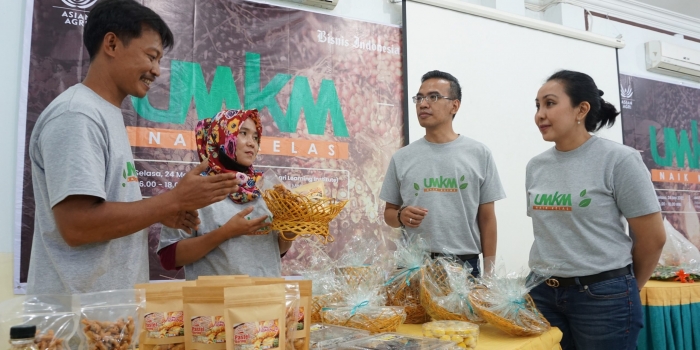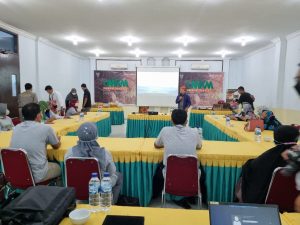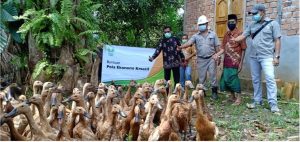Record numbers attend annual Tanoto Scholars Gathering
#TSG15 - Tanoto Scholars Gathering 2015A record 266 Tanoto scholars attended the Tanoto Scholars Gathering from 12 to 15 August...

Latest updates on what's happening in RGE Group

Inclusive growth strategy is aimed at improving livelihood and creating opportunities for broad-based progress.
Partnering the community and encouraging economic empowerment have been key factors in driving the success of Asian Agri, a member of the RGE group of companies. The palm oil producer supports rural development in the communities where it operates through smallholder programmes, CSR activities and skills development.
As part of its 2030 vision, Asian Agri has set its sights on helping communities achieve zero extreme poverty by increasing access to education and healthcare, and assisting micro, small and medium-sized enterprises (MSMEs) through skills uplifting.
This inclusive growth strategy is aimed at improving livelihood and creating opportunities for broad-based progress. In particular, Asian Agri is targeting the establishment of MSMEs in surrounding communities covering more than 500,000 ha by 2030. It has been running workshops to develop vocational skills and encourage entrepreneurship.

MSME owners attended a seminar at the Asian Agri Learning Institute to sharpen their business management skills.
In May 2022, the Company completed a skills training programme for 16 MSMEs located in the villages of Riau, North Sumatra and Jambi Province, near Asian Agri’s operations. The business owners are from different trades, selling woven sticks, sharpening sticks, pastries, cakes, tumpeng, while others are breeders of duck eggs.
“Developing MSMEs, as demonstrated by this training programme, is an important goal for Inclusive Growth, one of the pillars under Asian Agri 2030,” Asian Agri’s Manager of Sustainability Operations & CSR, Mr Putu Grhyate Yonata Aksa, said.
Conducted at the Asian Agri Learning Institute, the programme brought MSME owners from different villages together to fuel creativity, elevate skills and sharpen business management strategies, while enabling the MSMEs to conduct comparative studies. It aims to hone entrepreneurship among business owners and guide them in identifying business opportunities from various avenues.
“Through this training, we hope that MSMEs can meet the needs in their villages and eventually expand outwards by harnessing the potential of their marketplace,” CSR Coordinator of Asian Agri for the Riau Region, Mr Eko Budi Christyanto, said.
MSME enablement also provides smallholders with an alternative source of livelihood during replanting, when their oil palms are more than 25 years old. Replanted new oil palms typically take three to four years to become productive, during which time smallholders are unable to sell their fresh fruit bunches.
To help them through the waiting period, apart from providing cattle and other livestock as well as seeds, Asian Agri also supports farmers who want to venture into handicraft production or other businesses. Here are some examples of the company’s community development programmes:
Since 2018, as part of supporting a government program where the wives of smallholder farmers use palm fronds to create and sell crafts such as plates, trays, fruit holders and glass holders, Asian Agri provides training to help raise awareness and skills in marketing these crafts and connecting the crafts-makers with a wider network. This in turn helps to boost the local economy. The training is held at Asian Agri Training Center.
Commenting on this meaningful communal activity, Klumpuk, a member of Maju Jaya Lidi, Asian Agri’s oil palm farmer partner, said, “I am currently in the replanting period so I need another business. That’s why I joined this community, to produce handicraft as an alternative income for my family.”
Through this activity, each woman is able to make around IDR1.5 million (around US$103) each per month.

Asian Agri donated egg-producing ducks to the community to help create a new long-term income source.
To encourage self-sufficiency and boost incomes in the community, Asian Agri equips local communities with the resources to raise egg-producing ducks and provides training to market the eggs and process them into higher value commodities, such as salted eggs.
Compared to chicken eggs, duck eggs fetch higher prices and are easy to produce, making them an ideal business for communities who are more used to growing crops than rearing animals.
“Initially, there was resistance because the community was used to receiving donations, in the form of food. However, after understanding that having a long-term source of income is much more important and sustainable, they were convinced and willing to try,” the Manager of PT Gunung Melayu and PT Saudara Sejati Luhur (PT SSL), business units of AA in North Sumatra, Mr Frank SE Nadeak, said.
Madam Paenah’s family runs a 30-year-old peanut bread business in Bata Aman Village, North Sumatra. Her husband used to travel to the next town to sell the peanut bread. When he passed away, sales fell considerably and the business started making losses. The mother of three was in distress.
To help Madam Paenah revive the business, Asian Agri provided a new oven and gave her some useful marketing techniques such as logo creation, signage installation, packaging and collaboration with local employee cooperatives. This helped her to increase sales within her immediate community.